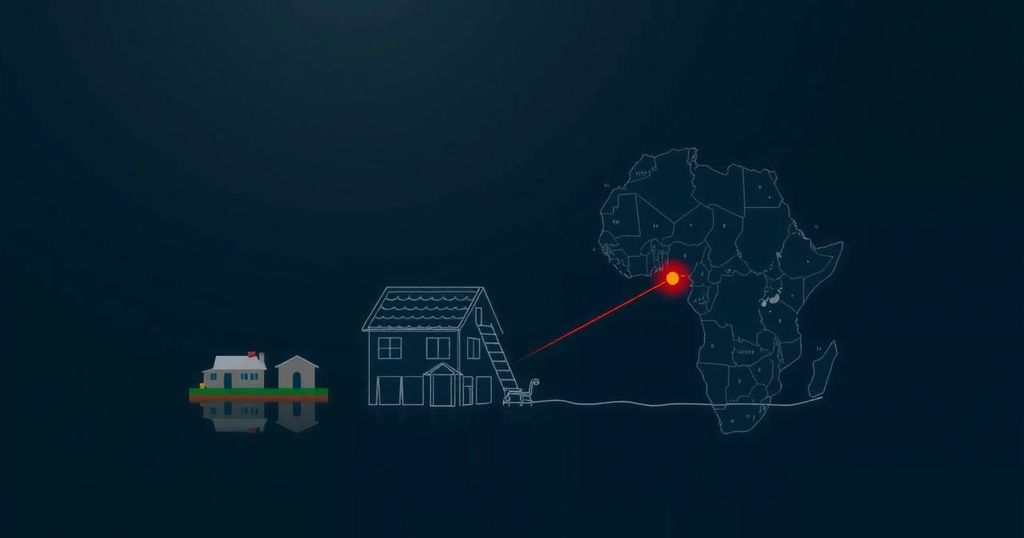Urgent Humanitarian Crisis: Millions Affected by Flooding in Chad, Nigeria, and Cameroon
Severe flooding in Central and East Africa has impacted over 2.7 million individuals, particularly in Chad, Nigeria, and Cameroon. There is an urgent need for financial support for emergency assistance as the crisis has exacerbated existing food insecurity and displaced communities. Action Against Hunger highlights the necessity for coordinated humanitarian efforts to alleviate suffering and promote resilience against future climatic threats.
In recent weeks, Central and East Africa have been devastated by torrential rains, with flooding affecting over 2.7 million individuals across Chad, Nigeria, and Cameroon. As the rains have continued unabated since July, Chad has been particularly hard-hit, with 1.7 million people affected and significant destruction reported in various provinces. The floods have resulted in the loss of more than 500 lives, with vast numbers of homes and agricultural fields submerged, escalating the hunger crisis in a nation already grappling with severe food insecurity. Action Against Hunger has underscored the urgent need for financial assistance to support emergency relief efforts for the impacted populations, which number 5.5 million in Chad alone. In Nigeria, states such as Borno and Adamawa have seen tens of thousands displaced due to rising waters. The capital of Borno, Maiduguri, has been critically affected, with approximately 414,000 residents suffering from the aftermath of the floods. Prior to this disaster, over 32 million Nigerians were already facing severe food insecurity, and the recent flooding threatens to exacerbate these conditions further. Cameroon also faces dire consequences, with approximately 236,000 individuals affected and over 30,000 acres of farmland destroyed. Concerns about waterborne diseases are mounting as essential infrastructure continues to collapse under the extreme conditions, further displacing populations. Humanitarian experts assert that immediate action is necessary to address the growing emergency and to support long-term resilience among affected families amidst an increasingly unstable climate. Overall, the floods are a grave reminder of how climate change is amplifying the challenges faced by already vulnerable communities in this region. Action Against Hunger reiterates the importance of mobilizing international support to respond to both immediate and ongoing needs as the crisis evolves. The organization has been actively engaged in providing support in Chad, Nigeria, and Cameroon through various programs aiming at nutrition, health, water, sanitation, and food security since the early 1980s. They emphasize that a coordinated humanitarian effort is critical to alleviate suffering and help affected individuals adapt to the impacts of climate change going forward.
The severe flooding currently impacting Chad, Nigeria, and Cameroon highlights the increasing frequency and intensity of climatic shocks in Central and East Africa. The context of this crisis serves as a backdrop to understand the urgent humanitarian situation, as millions face not only the immediate challenges of displacement and food insecurity, but also the longer-term implications of environmental degradation and climate instability. Flooding has numerous negative impacts, including loss of life, destruction of homes, and devastation of farmland, all of which threaten livelihoods and exacerbate conditions leading to food insecurity. Organizations like Action Against Hunger have been working in the region to alleviate such crises through various humanitarian programs since the 1980s, demonstrating their long-term commitment to improving resilience among affected populations.
In summary, the flooding crisis in Chad, Nigeria, and Cameroon poses severe humanitarian challenges, affecting millions and threatening food security and livelihoods. The destruction wrought by the floods necessitates immediate intervention to provide relief and support vulnerable populations. Urgent funding is critical to facilitate a timely emergency response and to enable affected families to recover and adjust to a changing climate in the years to come. Action Against Hunger continues to advocate for the mobilization of resources to address these pressing needs.
Original Source: www.actionagainsthunger.org




Post Comment